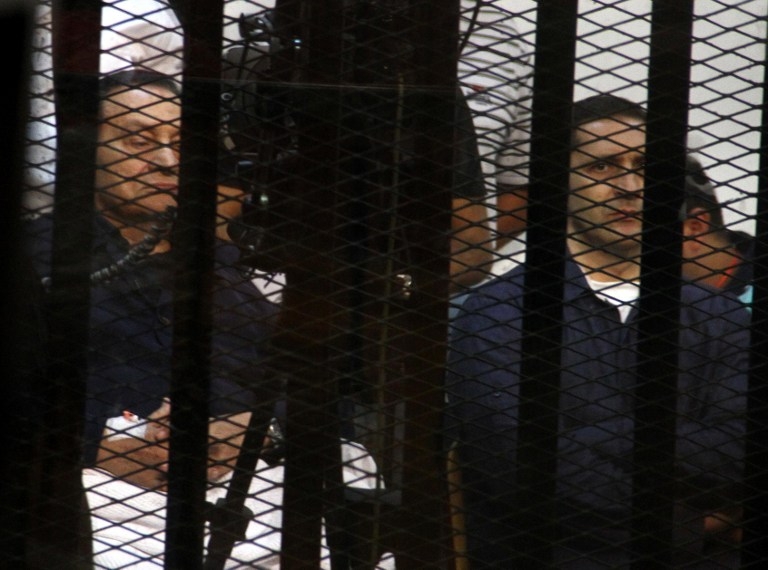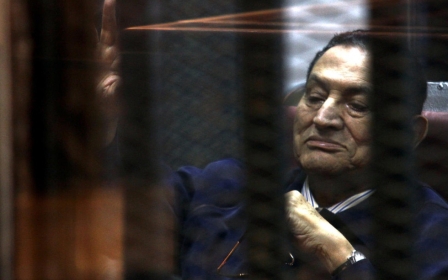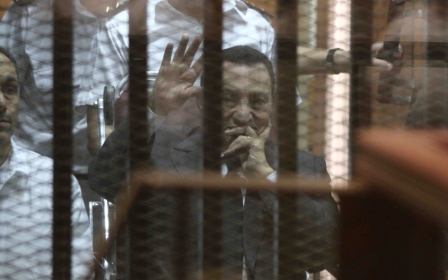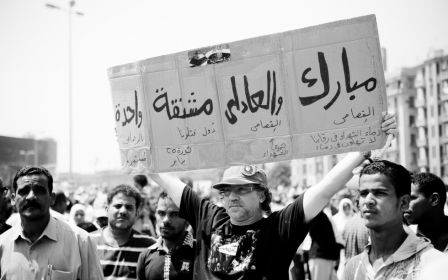Egypt's Mubarak gives passionate defence at court session

Egyptians are divided in their opinons over Hosni Mubarak after the ousted former president delivered a speech in which he passionately defended his 30-year during a court session on Wednesday.
Mubarak and seven security aides are accused of involvement in the deaths of hundreds of protesters during the 18-day uprising that toppled him in 2011. A previous sentence of life in prison was overturned on technical grounds.
The Egyptian court said it will deliver its verdict in the murder trial of Hosni Mubarak on 27 September.
The 86-year-old attended the court in a wheel chair, dressed in a blue uniform signifying his conviction on corruption charges earlier this week.
In his address to the court, Mubarak, read out a long speech defending his record, spanning his career as a military officer to his final days in power in February 2011.
"This may be my last speech," he told the court. "As my life approaches its end, thank God I have a good conscience, and I am satisfied I spent it in defence of Egypt.
"The Hosni Mubarak before you would never have ordered the killings of protesters," he said.
“The speech was addressed not only to the court but to the whole nation,” said Hosny Emam, president of the foreign press association.
“He was trying to give a very passionate speech in which he endeavoured to put the record straight, from his own point of view, saying that he should considered a hero and not a leader who’d given orders to kill demonstrators.”
His speech touched on what he said were the achievements of his three-decade rule. He said he "achieved the highest economic growth in Egypt's history."
He also defended himself against separate corruption charges he is facing, along with his two sons, on which the court will also rule in September.
Once reviled along with his police forces, whose abuses helped fuel the 2011 uprising, Mubarak's era is now recalled nostalgically by many after four years of unrest since his overthrow.
His elected successor, the Islamist Mohamed Morsi, was also toppled - by the military - in July 2013 after a turbulent year in office, sparking a wave of unrest that has killed more than 1,400 people, mostly Islamists.
Divided opinions
Once hailed as a "popular revolution," Mubarak's overthrow has increasingly since been portrayed by government officials and domestic media as a conspiracy involving foreign powers and militants.
"It was a conspiracy," insisted Mubarak's former interior minister Habib al-Adly in court on Wednesday, also in a speech defending himself against the murder charges.
While many Egyptians may not have been touched by Mubarak’s words during his previous trial in 2012, the events of the past two years have changed public opinion, observers say.
“Some sentiments have changed since the overthrow of the Brotherhood and their manipulation of religion into politics. Mubarak made that very clear and that [his words] will find an echo in public opinion,” said Emam.
“Mubarak is not perfect he admitted that he has made mistakes, I think he should be left to die in peace,” added Emam.
Still however, Egyptians who took part in the 25 January uprisings find Mubarak’s words empty.
Egyptians Blogger and journalist Wael Abbas referred to Mubarak’s address as “an actor on a stage” as he explained that he could only follow the speech over the phone with no electricity in his house.
“I have no electricity at home at the moment. Egypt’s infrastructure is in horrible condition and that’s not because of the revolution or the Muslim Brotherhood but because of Mubarak – who sold our gas and natural resources to Israel and Spain,” he told Aljazeera.
“As I listened to what he was saying, I remembered the sound of the bullets and my friends that fell at my side during and after the revolution,” added Abbas.
New MEE newsletter: Jerusalem Dispatch
Sign up to get the latest insights and analysis on Israel-Palestine, alongside Turkey Unpacked and other MEE newsletters
Middle East Eye delivers independent and unrivalled coverage and analysis of the Middle East, North Africa and beyond. To learn more about republishing this content and the associated fees, please fill out this form. More about MEE can be found here.




